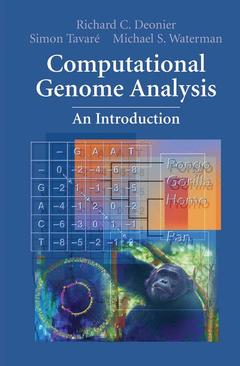Description
Computational Genome Analysis, Softcover reprint of hardcover 1st ed. 2005
An Introduction
Language: English
Subjects for Computational Genome Analysis:
Keywords
Alignment; Analysis; DNA; algorithms; bioinformatics; clustering; computer; computer science; database; genome; statistics
Support: Print on demand
535 p. · 15.5x23.5 cm · Hardback
Description
/li>Contents
/li>Biography
/li>Comment
/li>
Computational Genome Analysis: An Introduction presents the foundations of key problems in computational molecular biology and bioinformatics. It focuses on computational and statistical principles applied to genomes, and introduces the mathematics and statistics that are crucial for understanding these applications. The book is appropriate for a one-semester course for advanced undergraduate or beginning graduate students, and it can also introduce computational biology to computer scientists, mathematicians, or biologists who are extending their interests into this exciting field.
This book features:
- Topics organized around biological problems, such as sequence alignment and assembly, DNA signals, analysis of gene expression, and human genetic variation
- Presentation of fundamentals of probability, statistics, and algorithms
- Implementation of computational methods with numerous examples based upon the R statistics package
- Extensive descriptions and explanations to complement the analytical development
- More than 100 illustrations and diagrams (some in color) to reinforce concepts and present key results from the primary literature
- Exercises at the end of chapters
From the reviews:
"The book is useful for its breadth. An impressive variety of topics are surveyed...." Short Book Reviews of the ISI, June 2006
"It is a very good book indeed and I would strongly recommend it both to the student hoping to take this study further and to the general reader who wants to know what computational genome analysis is all about." Mark Bloom for the JRSS, Series A, Volume 169, p. 1006, October 2006
"Richard C. Deonier, Simon Tavare and Michael S. Waterman provide us wtih a 'roll up your sleeves and get dirty' (as the authors phrase it in their preface) introduction to the field of computational genome analysis...The book is carefully written and carefully edited..." Ralf Schmid for Genetic Research, Volume 87, p. 218, 2006
Richard C. Deonier is Professor Emeritus in the Molecular and Computational Biology Section of the Department of Biological Sciences at the University of Southern California. Originally trained as a physical biochemist, His major research has been in areas of molecular genetics, with particular interests in physical methods for gene mapping, bacterial transposable elements, and conjugative plasmids. During 30 years of active teaching, he has taught chemistry, biology, and computational biology at both the undergraduate and graduate levels.
Simon Tavaré holds the George and Louise Kawamoto Chair in Biological Sciences and is a Professor of Biological Sciences, Mathematics, and Preventive Medicine at the University of Southern California. Professor Tavaré's research lies at the interface between statistics and biology, specifically focusing on problems arising in molecular biology, human genetics, population genetics, molecular evolution, and bioinformatics. His statistical interests focus on stochastic computation. Among the applications are linkage disequilibrium mapping, stem cell evolution, and inference in the fossil record. Dr. Tavaré is also a professor in the Department of Oncology at the University of Cambridge, England, where his group concentrates on cancer genomics.
Michael S. Waterman is a University Professor, a USC Associates Chair in Natural Sciences, and Professor of Biological Sciences, Computer Science, and Mathematics at the University of Southern California. A member of the National Academy of Sciences and the American Academy of Arts and Sciences, Professor Waterman is Founding Editor and Co-Editor in Chief of the Journal of Computational Biology. His research has focused on computational analysis of molecular sequence data. His best-known work is the co-development of the local alignment Smith-Waterman algorithm, which has become the foundational tool for database search methods. His interests have also encompassed physicalmapping,




